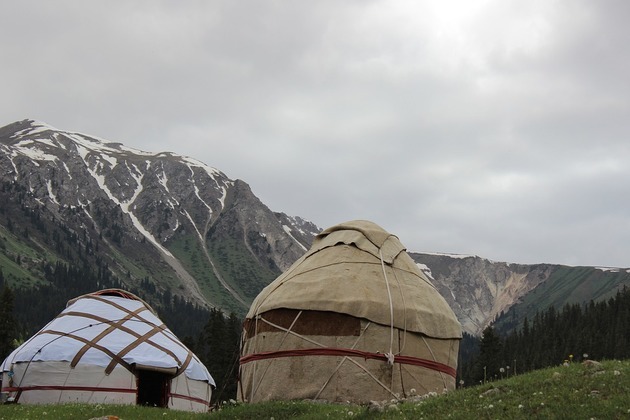In March 2009, a Kyrgyz delegation met with their Tajik counterparts in the Tajik city of Khujand and signed a protocol that included a 49-year lease of a patch of land along the countries’ disputed border to Kyrgyzstan to build a road and a bridge. The document, and the then-head of the security council who signed it on behalf of Kyrgyzstan, is now at the center of a scandal that has the Kyrgyz government crying treason.
The Diplomat writes that on February 10, the Kyrgyz parliament received a petition from the Prosecutor-General requesting permission to bring a criminal case against a sitting member of parliament: Adakhan Madumarov, the leader of the opposition Butun Kyrgyzstan Party. Madumarov has been summoned for questioning over the matter several times in recent weeks; last October Kyrgyz President Sadyr Japarov raised the matter of the “275 meters” of land as one of the hurdles to negotiating a solution to the perpetual (and increasingly violent) conflict over the border.
The particular parcel of land, reported as encompassing 5 hectares and being 275 meters long, is in the village of Kok-Tash (called Tort-Kocho by the Kyrgyz) and sits at the intersection of roads from Batken to Isfana in Kyrgyzstan and the road toward the Tajik enclave of Vorukh. The area has been the site of many clashes over the years, including the most recent flare up last month. The violence in late April 2021, which resulted in dozens killed and a significant amount of damage, was spread more widely across the border.
Madumarov denies any wrongdoing, stressing that the 2009 protocol, having never been ratified by parliament, was nonbinding. He also argued that the Batken-Isfana road, which enables travelers to avoid going through Tajik villages, would not have been constructed without the agreement. He said this week that the state’s case against him was “100 percent politically motivated.”
Madumarov is not the only Butun member to face legal trouble or the threat thereof recently. As the party leader faces possible treason charges (if the parliamentary commission gives consent) another party member is already in detention. Mirlan Uraimov was detained, reportedly at his home during the night, on February 8 in connection with charges under Article 327 of the Kyrgyz criminal code, which relates to public calls for seizure of power.
According to the State Committee for National Security (SCNS) and Uraimov’s lawyer, the alleged crime relates to a Facebook post by a user with his name, which stated, in part, that it is necessary to change a government that does not work well. The post also reportedly mentioned Orozayym Narmatova, another Butun member and activist who was detained in September after sharply criticizing Japarov, which the authorities equated to calling for the overthrow of the government. Narmatova previously was a supporter of Japarov but was elected to parliament in late November with the Butun faction. Last month she was accused of fraudulently obtaining a university degree and booted from her seat after being interrogated (the SCNS also summoned her father for questioning).
Uraimov, for his part, denies making the post, saying his page had been hacked a while ago. Meanwhile, Kyrgyz bloggers have commented on how easily any of them may find themselves in Uraimov’s shoes. Where is the line between political activism and what the authorities view as calls to bring down a government?
The SCNS, as 24.kg reported, called on Kyrgyz citizens “not to succumb to various kinds of anti-constitutional provocations” on social media “aimed at destabilizing” Kyrgyzstan.
Eurasianet’s Ayzirek Imanaliyeva last month explained the political dynamics seemingly behind the campaign against Butun: “What is curious about this confrontation is that Japarov’s and Madumarov’s parties are only natural foes in that they ostensibly appeal to similar sections of the electorate. Both have built their political brand on populist nationalism and have strong followings among the migrant laborer class.”
Madumarov came in second in the January 2021 presidential election, with under 7 percent of the vote against Japarov’s nearly 80 percent. Butun holds six seats in the 90-member parliament.
Accusing Madumarov of the eternal problem of the Kyrgyz-Tajik border may be politically convenient for the Japarov government right now. But pursuing such a line inadvertently throws into possible question other agreements made by an array of past Kyrgyz governments: which will Bishkek honor, and which will Bishkek label “treasonous”? All the while, none of this serves to address the very real problem of the border.






